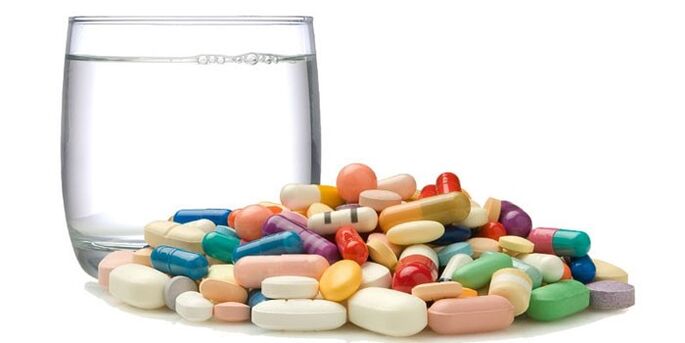Hypertension is the most common cardiovascular disease, symptoms after age 60-65 affecting a large part of the population. The diagnosis has several names, including baseline hypertension (AH), arterial hypertension (AH). The disease is chronic, the main task of each patient is to avoid exacerbations and prolong remission (disappearance of symptoms) by pharmacological and non-pharmacological methods.
What is high blood pressure?
Arterial hypertension is a steady rise in blood pressure above tolerable levels (starting at 140/90 mm Hg) under the influence of triggers. This diagnosis is known as the "silent killer". The pathological process takes place in an asymptomatic form for a long time, but during an attack significantly increases the risk of stroke, myocardial infarction and other dangerous diseases. The dangerous complications of GB can be life-threatening, so the disease needs to be diagnosed promptly and fully treated.
Hypertension develops due to dysfunction of the higher nerve regulatory centers, kidneys and blood vessels. If not treated in time, the pathological process leads to organic and functional disorders of the heart, organs of the central nervous system and kidneys. Incorrectly selected therapy can lead to disease progression with increased pain levels.
Classification of hypertension
In 2003, a unified classification of hypertension was defined according to the severity of the disease. The decisive factor in this division is considered to be the true reading of blood pressure, as determined by manometer in a particular clinical case. Hypertension is also classified by origin (primary, secondary), stage (transient, stable, sclerotic) and risk level of cardiovascular disease. This classification helps to simplify the diagnosis, helping to determine more accurately the treatment regimen for each hypertensive patient.

Degree of arterial hypertension
With an increase in blood pressure (BP), it can be suspected that arterial hypertension is progressing, especially if this health problem cannot be resolved with non-pharmacological methods. It is important to know that the optimal blood pressure is 120/80 mm Hg. Art, normal - 120-129 mm Hg. Art. (systolic blood pressure - SBP) and 80-84 mm Hg. Art. (diastolic - HATTr), normal height - 130-139 mm. rt. Art. (SAD) and 85-89 mm. rt. Art. (FATHER). Deviations from these numbers indicate serious pathologies of the body. Doctors distinguish 3 degrees of GB:
- Grade 1 (mild) hypertension is characterized by unstable pressure that fluctuates over several days between 140/90 and 159/99 mm Hg. Art. The risk of developing a hypertensive crisis is minimal, with no symptoms of organic damage to internal organs and the central nervous system. To relieve pain, in addition to taking medication, the patient needs to get enough rest, excluding stressful situations. Positive emotions, a walk in the fresh air is especially helpful.
- Grade 2 arterial hypertension develops rapidly. Blood pressure readings vary from 160/100 to 179/109 mm Hg. Art. , Have symptoms of hypertensive crisis (cold sweats, goosebumps, red face). Patients are worried about migraine attacks, dizziness, poor sleep, difficulty breathing. Clinical manifestations of hypertension: transient cerebral ischemia (decreased organ blood flow), blood creatinine elevation, retinal artery stenosis, left ventricular hypertrophy (increase in size), microalbuminuria(protein detection in urinalysis). It is impossible to normalize the condition without medication.
- High blood pressure grade 3 (severe) with a sharp decrease in vision, poor memory, tachycardia (increased heart rate). A hypertensive crisis develops. BP index - from 180/110 mm Hg. Art. and higher. Possible complications include hypertensive encephalopathy, cerebrovascular thrombosis and aneurysms (distended by pathological dilation of the vessels), left ventricular and renal failure, hemorrhage (bruising) andoptic nerve swelling. Pathological changes are irreversible.
Cardiovascular risk level
To predict the likelihood of complications in advanced arterial hypertension, the first step is to determine the cardiovascular risk index. This requires the consultation of a specialist, a complicated diagnosis. The degree of hypertension, provoking relapses (physiological and pathological) is taken into account. Common risk factors are:
- smoking, other bad habits;
- high cholesterol in the blood;
- sedentary lifestyle;
- obesity, including the abdomen (most of the fat is stored in the abdomen);
- age (women over 65 years old, men over 55 years old);
- fasting sugar index 5, 6-7, 0 mmol / l;
- impaired glucose tolerance, which is determined by a special test;
- the presence of diseases of the cardiovascular system in relatives;
- Male.
Patients with high cardiovascular risk if, in addition to high blood pressure, have concomitant chronic diseases:
- Diabetes;
- heart failure;
- violation of lipid (fat) metabolism;
- asthma;
- extensive damage to the retina;
- coronary artery disease;
- kidney failure stage 4;
- stroke;
- cerebrovascular disease (damage to the blood vessels of the brain);
- signs of peripheral arterial occlusive disease of the lower extremities (atherosclerosis);
- damage to other internal organs.

This information helps doctors predict the clinical outcome of the disease. To determine the cardiovascular risk index for each degree of hypertension, you need to be familiar with the table below:
| Common risk factors (RFRs) | Blood pressure | High blood pressure risk 1 degree | Arterial hypertension grade 2, risk | High blood pressure level 3 risk |
|---|---|---|---|---|
| no risk factor | normal risk | short | medium | high |
| 1-2 | short | medium | high | high |
| more than 3 | low-medium | high | high | high |
| damage to other internal organs, stage 3 kidney disease, diabetes | high | high | high | very high |
| CVD, stage 4 chronic kidney disease with involvement of other organs or common risk factors | very high | very high | very high | very high |
Treatment of high blood pressure
The classification of GB by stage and risk helps to accurately determine the drug treatment regimen, quickly stop the pain, prolong the remission time. If primary arterial hypertension develops (isolated), depending on medical recommendations, the prognosis is favorable. The secondary form of the disease often presents with complications.
If the disease is not treated in time, even with medication, it is difficult to stabilize high blood pressure. General recommendations by specialists, if diagnosed with grade 1, 2, or 3 hypertension, are outlined below. . It is recommended to supplement by taking medication as prescribed by the attending physician:
- Adhere to the therapeutic diet. It is important to reduce salt intake, enriching the daily diet with foods with potassium and magnesium to strengthen the heart muscle (seeds, nuts, legumes and grains, green vegetables).
- Reject bad habits. This applies not only to drinking and smoking, but also to the need to increase physical activity, leave behind a "sedentary" lifestyle and go for a walk in the fresh air.
- Weight control. If the patient with arterial hypertension is obese, it is necessary to give up greasy, fried and smoked foods, and arrange a regular fasting day.
- Physical therapy. To prevent and prolong GB remission, moderate-intensity aerobic exercise, 30 minutes, 5 times a week is recommended.
- Reception of a multivitamin complex. The composition of such drugs should contain potassium, magnesium, iron and other trace elements important to the body.

Medical therapy
Medication depends on the degree of hypertension and accompanying symptoms. The following are the optimal programs for the conservative treatment of arterial hypertension:
- In the mild stage of the disease, the patient is prescribed ACE inhibitors, angiotensin receptor antagonists, calcium channel blockers.
- If arterial hypertension of risk grade 2–4 develops, an integrated approach to the problem is needed, combining several representatives of different pharmacological groups in a conservative treatment regimen. These are the drugs above in combination with thiazide diuretics.
- In the complicated course of this disease, in addition to the above drugs, the doctor recommends taking alpha or beta blockers. This need arises if the weak body tolerates high doses of diuretics).























